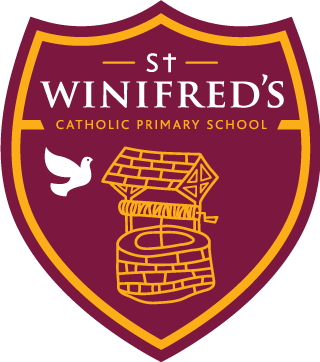Local Offer
Local Offer 2024
Special Educational Needs and Disability (SEND)
St Winifred’s School is an inclusive school and alongside quality first teaching and a broad and rich curriculum we may offer the following additional and different support for children with SEND.
There are 4 Categories of SEND:-
Communication and Interaction
- Pre-teaching of new concepts and vocabulary to enhance learning in language groups overseen by the school speech and language therapist.
- Provision of individually tailored visual support , including individual timetables and behavioural cue cards.
- Assessment by and intervention from the school speech and language therapist. St Winifred’s School has bought into enhanced speech and language support and have their own therapist working in school.
- Provision of small group speaking and listening skills delivered by Teaching Assistants specifically trained by the Speech and Language Therapist.
- Delivery of individual SALT programmes by the school speech and language therapist.
- Outreach support via teachers from ‘Drumbeat ASD School’.
Cognition and Learning
- ICT and Assistive technology e.g. interactive whiteboards and regular access to computers using specific SEND programmes.
- Educational Psychologists work closely with referred children and their parents/carers and provide support in the form of school based assessments and meetings.
- Specific Learning Difficulties Advisor support and assessment.
- Use of support programmes and materials for numeracy and literacy.
Social, Emotional and Mental Health
- Mentor support focusing on social and emotional development and promoting positive peer interaction delivered 1:1
- Outreach support provided by New Woodlands School targeting those pupils who have emotional/behavioural needs that affect their learning.
- Intervention from the Children’s Society Targeted Family Support service for children and their families both in school and in the home.
- Intervention from the child and adolescent mental health service (CAMHS) for children and their parents/carers on referral, delivered at CAMHS or in school as appropriate.
- ‘Drawing and Talking Therapy’ this is a gentle non-intrusive method of working with children who need a little help to support their emotional and learning needs.
- Use of resources to promote positive peer interaction e.g. Circle of Friends and ‘Friendship terrace’
- Play leaders initiating and supporting activities during lunch breaks. Buddy systems for support during playtimes and lunchtimes.
- Personalised behaviour support programme
- Outreach behaviour support via Outreach Inclusion
Sensory and Physical
- Provision of resources to enhance independent learning including easy-grip scissors and rulers, coloured overlays, use of dyslexia friendly coloured paper and font, non-fidget cushions, privacy screens and writing slopes.
- Assessment by and intervention from an occupational therapist (OT), on referral. The implementation of individual O.T. programmes when recommended.
- Liaison with medical professionals and medical care plan assistance via School Nurse
Access to a supportive environment
- Safeguarding procedures in place.
- E-Safety/CEOP training for all staff
- Compliance with Disability Discrimination Act
- School website
Universal Parent liaison Offering
- Open days for parents and prospective parents
- Parent evenings and learning targets
- Meetings with Inclusion Managers on request and at parent evenings.
- Contact books for some children
- International Week
- Parent Workshops
- End of Year reports.

 St
Winifred's Primary School
St
Winifred's Primary School

